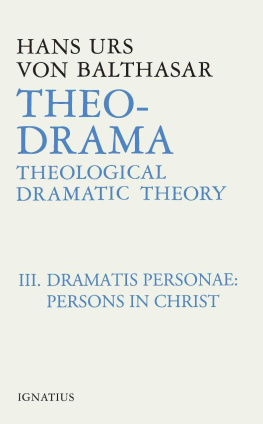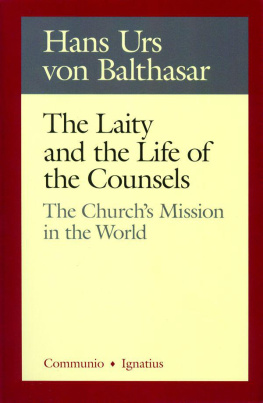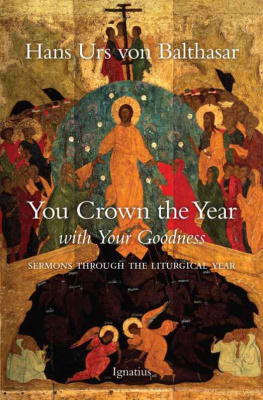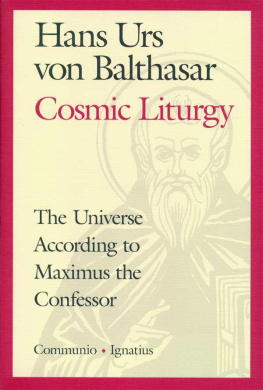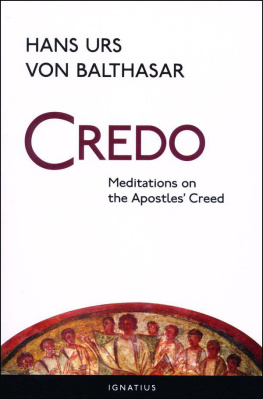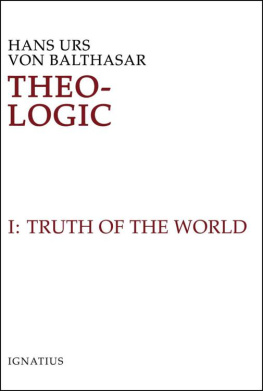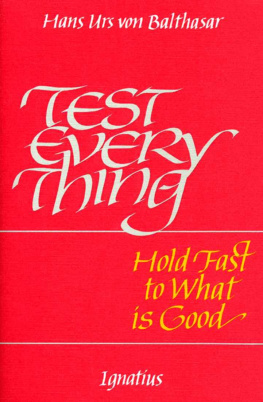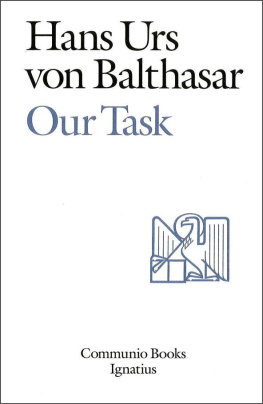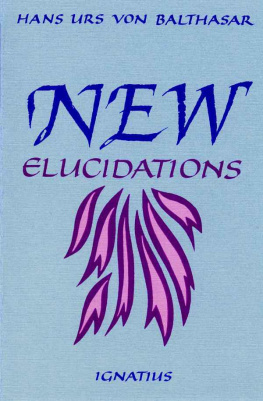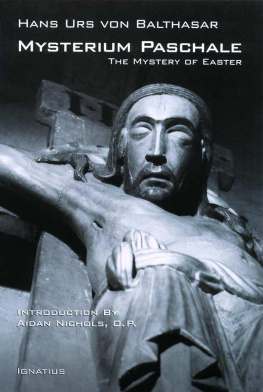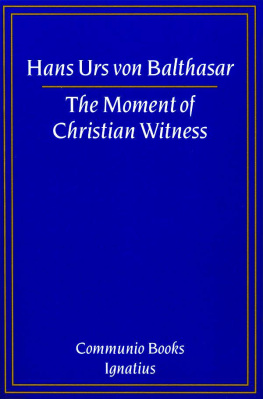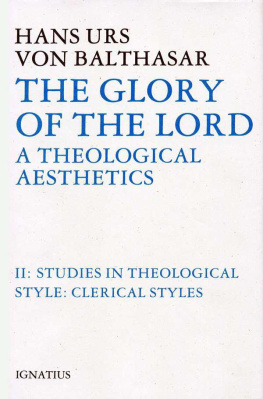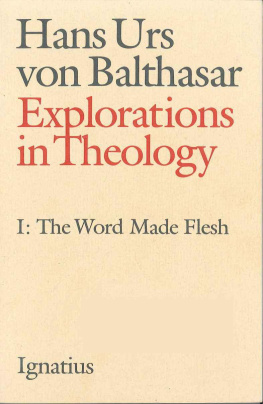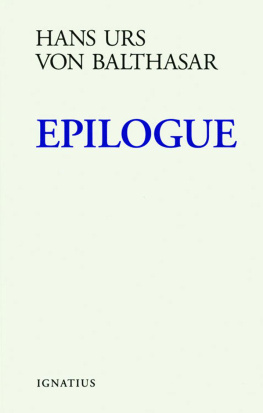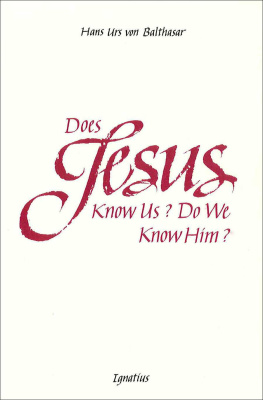Hans Urs von Balthasar - A Theology of History
Here you can read online Hans Urs von Balthasar - A Theology of History full text of the book (entire story) in english for free. Download pdf and epub, get meaning, cover and reviews about this ebook. year: 1994, publisher: Ignatius Press, genre: Religion. Description of the work, (preface) as well as reviews are available. Best literature library LitArk.com created for fans of good reading and offers a wide selection of genres:
Romance novel
Science fiction
Adventure
Detective
Science
History
Home and family
Prose
Art
Politics
Computer
Non-fiction
Religion
Business
Children
Humor
Choose a favorite category and find really read worthwhile books. Enjoy immersion in the world of imagination, feel the emotions of the characters or learn something new for yourself, make an fascinating discovery.
- Book:A Theology of History
- Author:
- Publisher:Ignatius Press
- Genre:
- Year:1994
- Rating:3 / 5
- Favourites:Add to favourites
- Your mark:
- 60
- 1
- 2
- 3
- 4
- 5
A Theology of History: summary, description and annotation
We offer to read an annotation, description, summary or preface (depends on what the author of the book "A Theology of History" wrote himself). If you haven't found the necessary information about the book — write in the comments, we will try to find it.
A Theology of History — read online for free the complete book (whole text) full work
Below is the text of the book, divided by pages. System saving the place of the last page read, allows you to conveniently read the book "A Theology of History" online for free, without having to search again every time where you left off. Put a bookmark, and you can go to the page where you finished reading at any time.
Font size:
Interval:
Bookmark:
A THEOLOGY OF HISTORY
HANS URS VON BALTHASAR
OF HISTORY

COMMUNIO BOOKS
IGNATIUS PRESS
Title of the German original:
Theologie der Gesckichte
1959 Johannes Verlag
Einsiedeln, Switzerland
First English edition:
1963, Sheed and Ward, New York
Published with ecclesiastical approval
Cover by Roxanne Mei Lum
Reprinted 1994 Ignatius Press, San Francisco
All rights reserved
ISBN 978-0-89870-460-0 (PB)
ISBN 978-1-68149-125-7 (EB)
Library of Congress catalogue number 93-78536
Printed in the United States of America
The Absolutely Unique
The Unique as the Historical Norm
Existence as Receptivity
Christs Time and Human Time; Faith
The Son and Salvation History
Creation and Redemption
Grace as Bringing Forth History
The Role of the Holy Spirit
The Forty Days
The Sacraments
The Mission of the Christian and the Churchs Tradition
The King
Tension in the Eidos and States of Life in the Church
Eidos in Transcendence: The Religious State
Eidos in Immanence: The Lay State; Progress, Vertical and Horizontal
Sacred History within Secular History
Fullness and Progress
The Horsemen of the Apocalypse; The Lord and His Bride
T HE TROUBLE WITH the first edition of this little sketch was that the title promised more than the book was meant to contain. It should really have been called the nucleus of a theology of history. It was only intended to be about the relation of Christ, as belonging christologically within time, to time in general, the time of human history, with the Churchs time mediating between them as the universalisation, accomplished by the Holy Spirit, of Christs temporal and at the same time archetypal existence. I landling it this way involved looking at the subject exclusively from above, not explicitly stating but rather taking for granted created things as the content which is given its form by the christological categories. This made it impossible to give an adequate treatment of the total view of a theology of history promised in the title, embracing both the orders of Creation and Redemption.
Without straining the framework of a brief outline, the second editionby means of an introduction and a more detailed final chapter, as well as by various deepenings of the main body of the texthas attempted to establish a balance, so that the intersection of the two spheres and thus the whole form would become visible, or at least be indicated. I have not tried to do more than this; if on every page the questions introduced cry out for more thorough discussion (there is not even any full treatment of the scriptural evidence, the few quotations being scarcely more than indications), the author would like to reserve the right to return at some later date to individual aspects of the theme.
BASEL, CHRISTMAS 1958
S INCE MAN FIRST BEGAN to philosophize he has sought to grasp things by distinguishing two elements: the factual, singular, sensible, concrete and contingent; and the necessary and universal (and, because universal, abstract), which has the validity of a law rising above the individual case and determining it. This scheme of thought is at the basis of Western philosophy and can be followed down throughout its history. It appears to correspond both to mans way of knowing and to the structure of being (which for both Plato and Aristotle, and their successors, are intimately connected), but the mode of thought which it reflects is discursive rather than directly intuitive, and the mode of existence is one in which things are always phenomena of an essential structure rationally ordered and arranged according to genus and species.
The two elements can, of course, be differently emphasized. The emphasis can be placed on the (relatively) universal and necessary aspect in such a way that the factual, empirical element encountered in the sensible world is regarded simply as the point where the rationally ordered lines of being rather untidily intersect, so that it is the thinkers job to unravel them and thus reduce them, wholly or in great part, to the essential. But the empirical tradition has always protested against this devaluation of the particular fact; for it, what is real is the unrepeatable, the concrete, the historical, and abstract laws of being spring from an inadequate attempt on the part of our limited powers of thought to cope with a factual world which we can never fully master.
There can, however, be no doubt that the rational systemsin both Greek and Christian tradition, and down to Kant and Hegelhave been accepted as the pillars of philosophy in its noblest sense, and as the more profound as well as higher form of philosophy; whereas empiricism, underestimating the power of abstraction and stopping short at the sensible facts, provides, superficially, the antithesis to this thesis but is in practice just something that is always there for real philosophy to overcome.
This evaluation is certainly tempting: nevertheless it overlooks certain features of thought and being which in the long run take their revenge. It is tempting because a deeper explanation of everything in the world of appearance always seems to lie in the world of essences: wisdom and experience can interpret the incomprehensible as presenting the hidden nature of a particular man or race, or of human nature itself, perhaps in conjunction with certain universal laws which govern the chance event. How stubborn that belief is may be seen from the astrological systems of ancient civilizations and their survival among the superstitious today. By comparison with this soothing reduction of fact to the laws of essence, the obstinate resistance of the historical fact seems not so much a positive contribution as an obstacle to thought.
The most grandiose attempt to master the realm of fact and history through reason was undertaken by Hegel; he interpreted the whole sequence and constellation of facts in nature and in human history as the manifestation of an all-embracing rational spirit, rational precisely in its factual manifestation. This may in one sense be regarded as the highest tribute of reason to the realm of fact and history, since the latter is then no longer mere phenomenon, outside the scope of law-giving reason, but a meaningful presentation of reason itselfwhich indeed requires this manifestation in order to be reason, so as to communicate itself to itself. But it may equally be regarded as the final devaluation of the historical, in that reason has finally disposed of it, leaving no room for genuine creativity or freedom in the person who acts. It was inevitable that one road at least should lead from Hegel to Marx. But that road offers no solution to our problem; for dialectical materialism does not involve taking empirical facts and events seriously, but on the contrary finally subjects them to a tyranny of mechanical processes governed by abstract laws, these merely taking the place of the old essences and their much freer system of teleological law.
Any attempt to interpret history as a whole, if it is not to succumb to gnostic myth, must posit some subject which works in and reveals itself in the whole of history and which is at the same time a being capable of providing general norms. This can only be either God himselfbut he does not require history in order to communicate himself to himselfor man; but he, insofar as he is a free, acting subject, is always some one, particular individual who plainly cannot dominate history as a whole. It is true that there is a dialectic in mans nature, the relation between the uniqueness of the concrete person and the universality of his essence as man. What makes this dialectic so confusing is that it is of the nature of essence to realize itself only and always in the particular here-and-now, and to be not even thinkable in any other way. This means that basically there can be nothing of the here-and-now uniqueness of an individual historical person which is not included in his essence if considered ontologically (a logical definition of an essence is always, because of its structure, so wide-meshed and imprecise that a great deal can slip through it). It was this dialectic which led Thomas Aquinas to speak of an individuatio ratione materiae (individuation in terms of matter) as the only way to solve the difficulty within the structure of being; but it does in any case lead, when applied to history, to a highly mysterious concept of communication and communion, at the level of essence, between free persons whose metaphysical essence is identical, so that when we conceive of that essence in its historical realization it can only unfold in the form of a common destiny for all the persons who constitute it.
Next pageFont size:
Interval:
Bookmark:
Similar books «A Theology of History»
Look at similar books to A Theology of History. We have selected literature similar in name and meaning in the hope of providing readers with more options to find new, interesting, not yet read works.
Discussion, reviews of the book A Theology of History and just readers' own opinions. Leave your comments, write what you think about the work, its meaning or the main characters. Specify what exactly you liked and what you didn't like, and why you think so.


